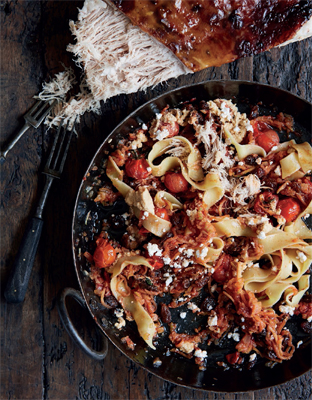
Confit of pork belly with pappardelle and cheese
I had the pleasure of sampling this rustic, flavourful dish in Greece. If you cannot obtain Mizithra cheese, use Kefalotyri or Pecorino Romano instead. The pork belly, should you have any left over, is delicious cut into thick lardons and pan-fried, then added to a salad of frisée or dandelion leaves, with a little strong cheese crumbled over. You need to start preparing this dish at least 24 hours in advance.
SERVES 6
800g–1kg piece of pork belly, well layered with fat
1 orange
1 lemon
4 thyme sprigs
100ml oil from the semi-confit cherry tomatoes (see below)
400ml cold water
200ml light olive oil
150g tomato purée
1 garlic clove, chopped
150g Greek flower cheese or ricotta
150g Mizithra (Greek fresh sheep or goat’s cheese)
½ onion (about 75g), peeled and finely chopped
4 tbsp red wine vinegar
30g sultanas, blanched for 1 minute and drained
½ apple, preferably Granny Smith, cut into fine julienne
10 sage leaves, snipped
400g dried pappardelle
10 semi-confit cherry tomatoes
Freshly ground pepper
Preheat the oven to 220°C/Gas 7.
Rinse the pork belly in cold water. Pat dry then, using a very sharp knife, make incisions, 2mm deep, in several places through the rind, to assist the cooking.
Finely pare the zest from the orange and lemon and set aside. Slice the orange and lemon across into rounds, about 2mm thick, then spread the slices out in a shallow roasting dish and scatter over the thyme sprigs.
Lightly oil the pork rind, using some of the cooled oil from the semi-confit cherry tomatoes – dipping your fingers into the oil and using them to spread it. Place the pork, rind side up, on top of the citrus slices, then pour the cold water into the dish (not over the meat).
Roast for 30 minutes, then lower the oven setting to 150°C/Gas 2 and baste the pork rind with the cooking juices. Roast for a further 2 hours, basting every 30 minutes with the cooking juices.
Remove the pork from the oven and set aside to cool in the cooking juices. Once cooled, carefully transfer to a baking sheet or large ceramic dish. Cover with cling film then place a tray on top of the pork and weight it down, using a 3–5kg weight, so that the tray presses heavily down on the pork. Refrigerate for at least 24 hours, and up to 48 hours.
Strain the pork cooking juices into a pan through a fine chinois and let bubble to reduce until thick enough to lightly coat the back of a spoon; set aside for the sauce.
For the tomato sauce, put the 200ml olive oil, tomato purée, garlic, flower or ricotta cheese and 100g of the Mizithra cheese in a food processor or blender and blitz for 1–2 minutes until smooth. Transfer to a bowl and set aside.
Heat the remaining tomato confit oil in a large frying pan. Add the onion, then after 1 minute add the wine vinegar. Let bubble to reduce by half then add the reduced pork juices, tomato sauce and sultanas and simmer over a gentle heat for 15 minutes. Finally, add the apple and sage.
Meanwhile, bring a large pan of water to the boil and salt well. Add the pappardelle and cook for 7–9 minutes until al dente (cooked but firm to the bite).
While the pasta is cooking, heat the confit cherry tomatoes through over a gentle heat for a few minutes.
Drain the pappardelle as soon as it is ready, then tip it into the sauce in the pan and mix lightly. Add the semi-confit tomatoes and fork through gently.
Using a knife, remove a section of the pork rind then, using a fork, shred the pork flesh by scraping it out with the ends of the fork. Add the shredded pork to the pasta and sauce and mix through gently with the fork. Season with pepper to taste; there should be no need to add salt.
To serve, crumble over the remaining 50g Mizithra cheese, and sprinkle with the reserved orange and lemon zest. Serve at once, straight from the pan, so everyone can help themselves.